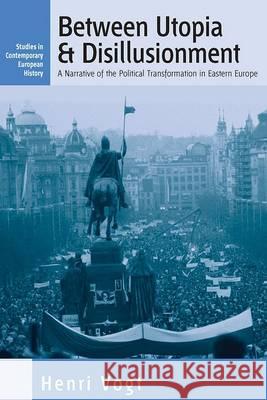Between Utopia and Disillusionment: A Narrative of the Political Transformation in Eastern Europe » książka
Between Utopia and Disillusionment: A Narrative of the Political Transformation in Eastern Europe
ISBN-13: 9781571818959 / Angielski / Twarda / 2004 / 320 str.
Between Utopia and Disillusionment: A Narrative of the Political Transformation in Eastern Europe
ISBN-13: 9781571818959 / Angielski / Twarda / 2004 / 320 str.
(netto: 480,17 VAT: 5%)
Najniższa cena z 30 dni: 498,70
ok. 30 dni roboczych
Bez gwarancji dostawy przed świętami
Darmowa dostawa!
"Vogt listens, and he does it brilliantly thus providing the reader with a truly unique narrative that is both analytically deep and enjoyable to read...Thanks to Vogt's confident, forceful and lucid style, the narrative never loses its grip on the academic debate; it incorporates an enormous body of the relevant literature in political science, philosophy, cultural anthropology, and social psychology. Yet, the text clearly gives priority to what makes this study exceptional: the live experiences of Eastern Europeans." - Kosmopolis. The Finnish Journal of Peace, Conflict and Global Politics Research Scholarly interpretations of the collapse of communism and developments thereafter have tended to be primarily concerned with people's need to rid themselves of the communist system, of their past. The expectations, dreams, and hopes that ordinary Eastern Europeans had when they took to the streets in 1989, and have had ever since, have therefore been overlooked - and our understanding of the changes in post-communist Europe has remained incomplete. Focusing primarily on five key areas, such as the heritage of 1989 revolutions, ambivalence, disillusionment, individualism, and collective identities, this book explores the expectations and goals that ordinary Eastern Europeans had during the 1989 revolutions and the decade thereafter, and also the problems and disappointments they encountered in the course of the transformation. The analysis is based on extensive interviews with university students and young intellectuals in the Czech Republic, Eastern Germany and Estonia in the 1990s, which in themselves have considerable value as historical documents. Henri Vogt is Professor of International Politics at the University of Turku, Finland. He received his doctorate from the University of Oxford, and has previously worked, inter alia, as Visiting Professor of European Studies at the University of the Saarland, Germany, and Senior Researcher at the Finnish Institute of International Affairs. His other books include A Responsible Europe? Ethical Foundations of EU External Affairs (coedited with Hartmut Mayer; Palgrave Macmillan 2006).
"Vogt listens, and he does it brilliantly thus providing the reader with a truly unique narrative that is both analytically deep and enjoyable to read...Thanks to Vogts confident, forceful and lucid style, the narrative never loses its grip on the academic debate; it incorporates an enormous body of the relevant literature in political science, philosophy, cultural anthropology, and social psychology. Yet, the text clearly gives priority to what makes this study exceptional: the live experiences of Eastern Europeans." · Kosmopolis. The Finnish Journal of Peace, Conflict and Global Politics Research
Scholarly interpretations of the collapse of communism and developments thereafter have tended to be primarily concerned with peoples need to rid themselves of the communist system, of their past. The expectations, dreams, and hopes that ordinary Eastern Europeans had when they took to the streets in 1989, and have had ever since, have therefore been overlooked - and our understanding of the changes in post-communist Europe has remained incomplete. Focusing primarily on five key areas, such as the heritage of 1989 revolutions, ambivalence, disillusionment, individualism, and collective identities, this book explores the expectations and goals that ordinary Eastern Europeans had during the 1989 revolutions and the decade thereafter, and also the problems and disappointments they encountered in the course of the transformation. The analysis is based on extensive interviews with university students and young intellectuals in the Czech Republic, Eastern Germany and Estonia in the 1990s, which in themselves have considerable value as historical documents.
Henri Vogt is Professor of International Politics at the University of Turku, Finland. He received his doctorate from the University of Oxford, and has previously worked, inter alia, as Visiting Professor of European Studies at the University of the Saarland, Germany, and Senior Researcher at the Finnish Institute of International Affairs. His other books include A Responsible Europe? Ethical Foundations of EU External Affairs (coedited with Hartmut Mayer; Palgrave Macmillan 2006).











